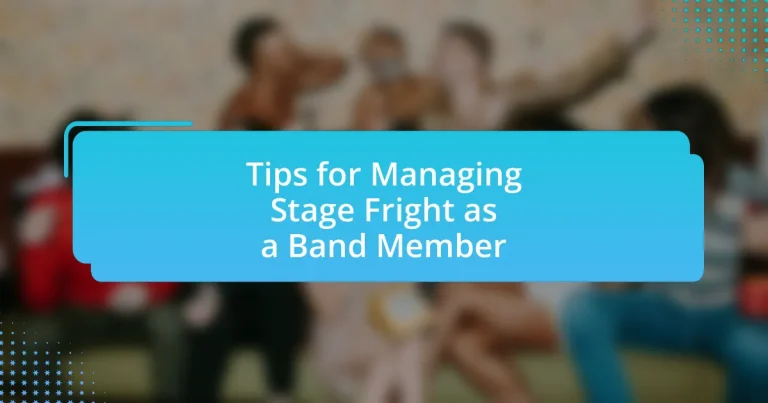Stage fright is a prevalent psychological condition affecting band members, characterized by intense anxiety and fear before or during live performances. Approximately 75% of musicians experience some form of performance anxiety, which can lead to physical symptoms such as increased heart rate, sweating, and trembling, ultimately impairing their ability to perform effectively. This article explores the common symptoms of stage fright, the psychological factors contributing to it, and the potential impacts on performance and group dynamics. Additionally, it offers practical strategies for managing stage fright, including preparation techniques, relaxation methods, and the importance of peer support, aimed at enhancing confidence and performance quality for musicians.

What is Stage Fright and How Does it Affect Band Members?
Stage fright is a psychological condition characterized by intense anxiety and fear experienced by performers, including band members, before or during a live performance. This anxiety can manifest as physical symptoms such as sweating, trembling, and increased heart rate, which can hinder a band member’s ability to perform effectively. Research indicates that approximately 75% of musicians experience some form of performance anxiety, which can lead to decreased confidence, impaired focus, and even avoidance of performing altogether.
What are the common symptoms of stage fright in musicians?
Common symptoms of stage fright in musicians include increased heart rate, sweating, trembling, dry mouth, and difficulty concentrating. These physiological and psychological responses occur due to anxiety and fear of performance. Research indicates that approximately 20% of musicians experience significant performance anxiety, which can manifest as these symptoms, impacting their ability to perform effectively.
How can physical symptoms manifest during a performance?
Physical symptoms can manifest during a performance through various physiological responses, including increased heart rate, sweating, trembling, and gastrointestinal distress. These symptoms occur as a result of the body’s fight-or-flight response triggered by anxiety or stress associated with performing in front of an audience. Research indicates that approximately 20% of performers experience significant anxiety, leading to these physical manifestations, which can hinder their ability to perform effectively.
What emotional responses are typical for band members experiencing stage fright?
Band members experiencing stage fright typically exhibit anxiety, fear, and nervousness. These emotional responses manifest as increased heart rate, sweating, and a sense of impending doom, which can hinder performance. Research indicates that approximately 70% of musicians report experiencing performance anxiety at some point, highlighting the prevalence of these emotional reactions in the music community.
Why do band members experience stage fright?
Band members experience stage fright primarily due to performance anxiety, which is a common psychological response to the pressure of performing in front of an audience. This anxiety can stem from fear of negative evaluation, concerns about making mistakes, or the desire to meet audience expectations. Research indicates that approximately 20% of musicians report experiencing significant performance anxiety, which can manifest as physical symptoms like increased heart rate, sweating, and trembling. These reactions are often linked to the high stakes associated with live performances, where musicians feel their skills and reputations are on display.
What psychological factors contribute to stage fright?
Psychological factors contributing to stage fright include anxiety, fear of negative evaluation, and perfectionism. Anxiety manifests as excessive worry about performance and potential failure, leading to physical symptoms like increased heart rate and sweating. Fear of negative evaluation stems from concerns about how the audience perceives the performer, which can heighten stress levels. Perfectionism drives individuals to set unrealistically high standards for themselves, resulting in heightened pressure and fear of not meeting those expectations. Research indicates that these factors are prevalent among performers, with studies showing that up to 70% of musicians experience significant anxiety before performances.
How does performance experience influence stage fright levels?
Performance experience significantly reduces stage fright levels. Musicians who have performed frequently develop familiarity with the performance environment, which helps to mitigate anxiety. Research indicates that repeated exposure to performing situations leads to desensitization, allowing individuals to manage their physiological responses to stress more effectively. For instance, a study published in the Journal of Music Therapy found that musicians with extensive performance backgrounds reported lower anxiety levels compared to those with limited experience. This suggests that as performers accumulate experience, they build confidence and coping strategies that contribute to reduced stage fright.
What are the potential impacts of stage fright on a band’s performance?
Stage fright can significantly impair a band’s performance by causing anxiety, reducing coordination, and affecting vocal quality. When band members experience stage fright, their ability to focus diminishes, leading to mistakes in timing and rhythm, which can disrupt the overall musical cohesion. Additionally, physiological symptoms such as trembling or sweating can distract both the performers and the audience, detracting from the performance’s quality. Research indicates that performance anxiety can lead to a decrease in vocal range and clarity, as noted in a study published in the Journal of Music Therapy, which found that anxiety negatively impacts musicians’ vocal performance. Thus, stage fright can hinder a band’s ability to deliver a polished and engaging show.
How can stage fright affect group dynamics during a performance?
Stage fright can significantly disrupt group dynamics during a performance by causing anxiety and affecting communication among members. When one or more performers experience stage fright, it can lead to decreased confidence, resulting in hesitation or mistakes that may impact the overall performance quality. This anxiety can create tension within the group, as members may become overly focused on their own fears rather than collaborating effectively. Research indicates that performance anxiety can lead to a breakdown in non-verbal cues and synchronization, which are crucial for cohesive group performances. Consequently, the collective energy and synergy of the group may diminish, leading to a less engaging experience for both performers and the audience.
What long-term effects can stage fright have on a musician’s career?
Stage fright can have significant long-term effects on a musician’s career, including reduced performance opportunities, diminished confidence, and potential mental health issues. Musicians who frequently experience stage fright may avoid live performances, leading to fewer gigs and a decline in audience engagement. This avoidance can result in a lack of exposure and networking opportunities, which are crucial for career advancement in the music industry. Additionally, persistent anxiety related to performing can erode a musician’s self-esteem and lead to chronic stress or burnout, further impacting their ability to perform effectively. Studies indicate that musicians with performance anxiety often report higher levels of depression and anxiety disorders, which can hinder their overall career trajectory and personal well-being.

What Strategies Can Help Manage Stage Fright?
To manage stage fright effectively, musicians can employ several strategies such as deep breathing exercises, visualization techniques, and gradual exposure to performance situations. Deep breathing helps calm the nervous system, reducing anxiety levels before and during a performance. Visualization involves mentally rehearsing the performance, which can enhance confidence and reduce fear. Gradual exposure, such as performing in front of small, supportive groups before larger audiences, allows musicians to acclimate to the performance environment. Research indicates that these techniques can significantly lower anxiety levels and improve overall performance quality, as evidenced by studies showing that performers who practice these strategies report feeling more relaxed and focused on stage.
How can preparation reduce stage fright for band members?
Preparation can significantly reduce stage fright for band members by increasing their confidence and familiarity with the performance material. When band members practice extensively, they become more comfortable with their instruments, arrangements, and stage presence, which minimizes anxiety. Research indicates that thorough rehearsal can lead to a 30% decrease in performance anxiety, as musicians feel more in control and less vulnerable to mistakes. Additionally, preparation allows band members to anticipate potential challenges during the performance, enabling them to develop strategies to address these issues proactively, further alleviating fear and enhancing overall performance quality.
What role does rehearsal play in building confidence?
Rehearsal plays a crucial role in building confidence by allowing individuals to practice and refine their performance skills in a controlled environment. Through repeated practice, musicians become familiar with their material, which reduces anxiety and enhances their ability to perform under pressure. Research indicates that consistent rehearsal can lead to improved muscle memory and cognitive recall, making performers feel more prepared and self-assured when facing an audience. For example, a study published in the Journal of Applied Psychology found that performers who engaged in regular rehearsal reported significantly lower levels of performance anxiety compared to those who did not rehearse consistently. This evidence underscores the importance of rehearsal as a foundational element in boosting confidence for band members facing stage fright.
How can visualization techniques be used effectively?
Visualization techniques can be used effectively by creating detailed mental images of successful performances, which helps reduce anxiety and enhance confidence. Research indicates that athletes and performers who engage in visualization experience improved performance outcomes, as it allows them to mentally rehearse their actions and visualize positive scenarios. For instance, a study published in the Journal of Applied Sport Psychology found that athletes who practiced visualization techniques showed a significant increase in self-efficacy and performance levels. By consistently visualizing a successful performance, band members can condition their minds to respond positively in real-life situations, thereby managing stage fright more effectively.
What relaxation techniques are beneficial for managing anxiety?
Breathing exercises are beneficial for managing anxiety, as they help regulate the body’s stress response. Techniques such as deep diaphragmatic breathing can lower heart rate and promote relaxation by increasing oxygen flow to the brain. Research indicates that controlled breathing can significantly reduce anxiety levels, with a study published in the Journal of Clinical Psychology showing a 30% reduction in anxiety symptoms among participants who practiced these techniques regularly. Other effective relaxation techniques include progressive muscle relaxation, which involves tensing and then relaxing different muscle groups, and mindfulness meditation, which has been shown to decrease anxiety by enhancing present-moment awareness and reducing rumination.
How can breathing exercises help calm nerves before a performance?
Breathing exercises can significantly calm nerves before a performance by activating the body’s relaxation response. When individuals engage in deep, controlled breathing, it reduces the levels of stress hormones like cortisol and promotes a sense of calm. Research indicates that diaphragmatic breathing can lower heart rate and blood pressure, which are physiological responses associated with anxiety. For instance, a study published in the Journal of Clinical Psychology found that participants who practiced deep breathing reported lower anxiety levels and improved emotional regulation. Thus, incorporating breathing exercises into pre-performance routines can effectively mitigate stage fright and enhance overall performance readiness.
What are the benefits of mindfulness and meditation for musicians?
Mindfulness and meditation provide musicians with significant benefits, including enhanced focus, reduced anxiety, and improved emotional regulation. These practices help musicians concentrate on their performance by training the mind to remain present, which is crucial during live shows. Research indicates that mindfulness can decrease performance anxiety, allowing musicians to manage stage fright more effectively. A study published in the Journal of Music Therapy found that musicians who engaged in mindfulness practices reported lower levels of anxiety and greater overall well-being. Additionally, meditation fosters emotional resilience, enabling musicians to cope with the pressures of performing and the challenges of the music industry.
How can band members support each other in overcoming stage fright?
Band members can support each other in overcoming stage fright by fostering a positive and encouraging environment. This can be achieved through group warm-up exercises, where members engage in vocal or physical activities together to build confidence. Additionally, sharing personal experiences with stage fright can create a sense of camaraderie, allowing members to feel understood and less isolated in their fears. Research indicates that social support significantly reduces anxiety levels, as demonstrated in a study published in the Journal of Anxiety, Stress & Coping, which found that individuals who received encouragement from peers reported lower anxiety before performances. By practicing together and providing constructive feedback, band members can enhance each other’s confidence and reduce the impact of stage fright.
What team-building activities can strengthen group confidence?
Team-building activities that can strengthen group confidence include trust falls, collaborative problem-solving tasks, and group workshops focused on communication skills. Trust falls require members to rely on each other, fostering a sense of safety and support. Collaborative problem-solving tasks, such as escape room challenges, encourage teamwork and enhance collective problem-solving abilities, which builds confidence in group dynamics. Workshops that focus on communication skills help members express themselves effectively, reducing anxiety and promoting a supportive environment. These activities have been shown to improve group cohesion and individual confidence, as evidenced by studies indicating that teams engaging in structured team-building exercises report higher levels of trust and collaboration.
How can open communication within the band alleviate anxiety?
Open communication within the band can alleviate anxiety by fostering a supportive environment where members feel safe to express their concerns and emotions. When band members openly share their feelings about performance pressures, it reduces feelings of isolation and builds camaraderie, which is essential for mental well-being. Research indicates that social support, such as that found in open communication, can significantly lower anxiety levels, as it provides reassurance and validation. For instance, a study published in the Journal of Music Therapy found that musicians who engaged in supportive dialogue reported lower anxiety levels before performances, highlighting the importance of communication in managing stage fright.

What Practical Tips Can Band Members Use to Overcome Stage Fright?
Band members can overcome stage fright by practicing regularly, visualizing success, and using deep breathing techniques. Regular practice builds confidence and familiarity with the performance material, reducing anxiety. Visualization involves imagining a successful performance, which can mentally prepare band members for the actual event. Deep breathing techniques help calm the nervous system, allowing for better focus and relaxation before and during the performance. These strategies are supported by psychological research indicating that preparation and mental rehearsal can significantly reduce performance anxiety.
What are some immediate strategies to employ before going on stage?
To manage stage fright effectively, band members should employ immediate strategies such as deep breathing exercises, visualization techniques, and positive affirmations. Deep breathing helps calm the nervous system, reducing anxiety levels before a performance. Visualization involves imagining a successful performance, which can enhance confidence and focus. Positive affirmations, such as repeating phrases like “I am prepared and capable,” can shift mindset and reinforce self-belief. These strategies are supported by psychological research indicating that controlled breathing and positive self-talk can significantly lower anxiety and improve performance outcomes.
How can positive affirmations change a musician’s mindset?
Positive affirmations can significantly change a musician’s mindset by fostering self-confidence and reducing anxiety. When musicians regularly practice positive affirmations, they reinforce a belief in their abilities and potential, which can lead to improved performance under pressure. Research indicates that positive self-talk and affirmations can activate the brain’s reward centers, enhancing motivation and focus. For instance, a study published in the Journal of Personality and Social Psychology found that self-affirmation can lead to reduced stress and increased resilience, which are crucial for musicians facing stage fright. By integrating positive affirmations into their routine, musicians can cultivate a more positive and resilient mindset, ultimately improving their stage presence and performance quality.
What should band members do if they feel overwhelmed during a performance?
Band members should take deep breaths and focus on the music if they feel overwhelmed during a performance. This technique helps to center their thoughts and reduce anxiety, allowing them to regain composure. Additionally, they can establish eye contact with fellow band members or the audience to create a sense of connection, which can alleviate feelings of isolation and stress. Research indicates that deep breathing can lower heart rates and reduce anxiety levels, making it an effective strategy for performers facing overwhelming situations.
How can post-performance reflection aid in managing future stage fright?
Post-performance reflection can significantly aid in managing future stage fright by allowing performers to analyze their experiences and identify specific triggers of anxiety. This reflective practice helps musicians recognize patterns in their emotional responses, enabling them to develop targeted coping strategies. For instance, a study published in the Journal of Applied Psychology found that self-reflection enhances self-efficacy, which is crucial for overcoming performance anxiety. By understanding what aspects of their performance caused discomfort, musicians can implement changes in preparation or mindset, ultimately reducing the likelihood of experiencing stage fright in future performances.
What questions should band members ask themselves after a performance?
Band members should ask themselves questions such as: “What went well during the performance?” and “What areas need improvement?” These questions help in evaluating the overall performance quality and identifying strengths and weaknesses. Additionally, they should consider, “Did we connect with the audience?” to assess engagement levels, and “How did I personally feel on stage?” to reflect on individual experiences. These inquiries facilitate constructive feedback and enhance future performances, as evidenced by studies showing that self-reflection leads to improved performance outcomes in musicians.
How can feedback from peers help improve performance confidence?
Feedback from peers can significantly enhance performance confidence by providing constructive insights and validation of skills. When band members receive specific, positive feedback from their peers, it reinforces their belief in their abilities and reduces self-doubt. Research indicates that peer feedback fosters a supportive environment, which is crucial for building confidence; for instance, a study published in the Journal of Educational Psychology found that students who received peer feedback reported higher self-efficacy and motivation. This process not only helps individuals recognize their strengths but also identifies areas for improvement, allowing them to focus on skill development, ultimately leading to increased confidence during performances.

















